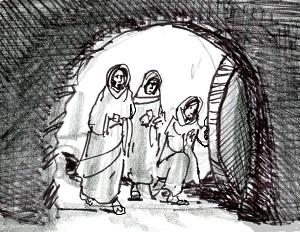
“The disciple, the one Jesus loved, ran faster than Peter and arrived at the tomb first” (John 20:4).
Saint John the Apostle and Evangelist
1 John 1:1-4; John 20:1a and 2-8
The closeness of the Feast of St. John the Evangelist to the Solemnity of Christmas is deliberate, and it focuses us like no other witness on the mystery of the Incarnation. His exquisite appeals in the first letter attributed to him describe his encounter with Jesus. Writing about "what we have heard, what we have seen with our eyes, what we have looked upon and touched with our hands," the author shows us how to believe not just with our minds but also with our physical senses and our hearts.
Today’s Gospel passage from John about the resurrection and the image of the two disciples running to the tomb also affirms that love outruns even authority in grasping the mystery of faith. The Gospel of John is also called the testimony of the "Beloved Disciple," or the "disciple Jesus loved."
Reading and praying over John's text is an invitation to enter into a love relationship. Jesus is called the bridegroom, and the first recorded miracle occurs at the wedding feast at Cana. To know Jesus is to enter the mysterious nuptial of the new covenant with God, a union made possible by the new wine, the breath of the Spirit, the pulse of God's own heartbeat in our bodily experience.
One scene in John's Gospel conveys this sense of intimacy between Jesus and his disciples. At the Last Supper, the “Beloved Disciple” reclines next to Jesus at the table and places his head on Jesus' chest as he speaks. He is listening to the Word by putting his ear close to Jesus' heart. For all the complex sacramental theology contained in the Fourth Gospel, this image captures the essential intimacy of discipleship. We are to unite ourselves to the heart of God in Jesus.
The physical closeness described here is also exhibited by Mary of Bethany, another beloved disciple, who anoints the head and feet of Jesus before his death (John 12:1-8). She breaks open the ampule of precious perfume as a sign of her own heart being broken and poured out. Jesus honors her by using the same gesture of washing the feet of his Apostles at the Last Supper.
We celebrate today’s feast best by imitating John and becoming beloved disciples ourselves. In calling us to a baptism that incorporates us into his body, Jesus loved us first. Our response is to let this intimacy overflow in our lives and to others, especially those most in need of God’s limitless compassion. We now extend the mystery of the Incarnation into the world, not just with our ideas and words but by reaching out to touch others with love.







